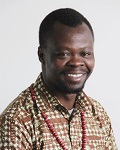Isaac Dery
- Postdoctoral Fellow
- University of South Africa

Abstract
Drawing on interviews and focus group discussions with men in northwestern Ghana, this project provides rich empirical insights and accounts on the range of social subjectivities, struggles, and tensions that shape postcolonial masculinities. My findings highlight how social subjectivities and multiple struggles around the meanings of masculinities are constantly contested, re/negotiated, and made sense in the face of enormous economic precarity. My findings further underscore the applications and cultural usefulness of developing robust evidence and knowledge base which privileges a critical reading and understanding of (African) men’s gendered subjectivities as historically contingent, culturally constructed, and constantly in dialogue with the structural and material realities that confront the everyday meaning-making of men. Situated within critical feminist intersectional framework, my findings invite critical African masculinities scholars to develop concepts, frameworks, epistemologies, and theories which are relevant to the cultural sensibility and meaning-making of the continent and its constituents. I argue that any academic intervention on gender and masculinities in Africa must draw on local resources and perspectives while simultaneously dialoguing with existing concepts in a way that adapts them usefully to African conditions and struggles. The limitations of ‘Northern’ concepts and theories sometimes impoverish understanding of social subjectivities and multiple struggles in the continent. African masculinity theorists need to take the best concepts and theories developed predominantly from the ‘North’ and find ways of using and applying them to illustrate and illuminate in the most beneficial way the nuances, complexities and contradictory subjectivities and struggles entangled in performances and enactments of gender broadly.

